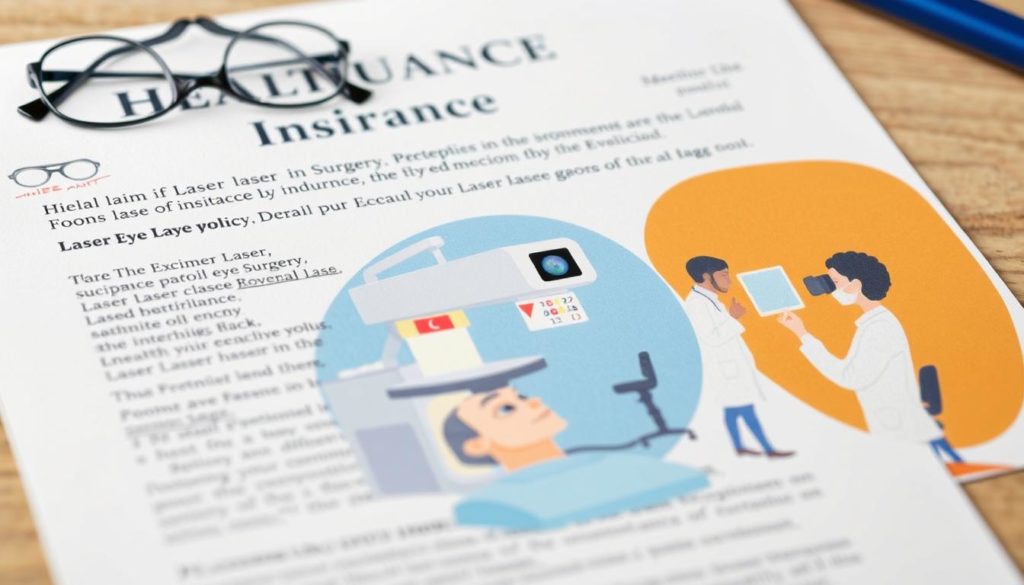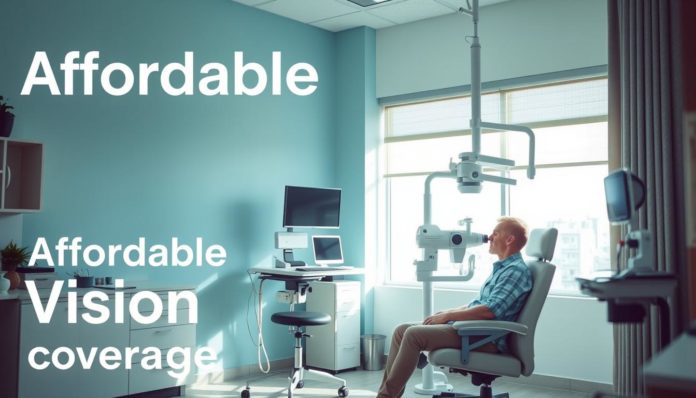Did you know laser eye surgery in the U.S. can cost between $2,000 and $3,000 per eye? This high cost makes it crucial to know if your health insurance covers it. Understanding health insurance for laser eye surgery is key.
Many believe laser eye surgery, like LASIK, is just for looks and not covered by insurance. But, the truth is different. Some insurance for eye care plans might cover it, especially if it’s needed for medical reasons. This article will help you use your health insurance wisely. It will also show you how to find affordable vision coverage for your laser eye surgery.
Understanding Laser Eye Surgery Benefits
Laser eye surgery has changed how we see the world. It uses advanced lasers to reshape the cornea. This corrects vision problems and improves eyesight. Let’s explore what this surgery does, its benefits, and who can benefit the most.

What is Laser Eye Surgery?
Laser eye surgery is a quick procedure done outside the hospital. It fixes myopia, hyperopia, and astigmatism. There are different types, like LASIK, PRK, and SMILE.
- LASIK (Laser-Assisted In Situ Keratomileusis)
- PRK (Photorefractive Keratectomy)
- SMILE (Small Incision Lenticule Extraction)
Each method reshapes the cornea with laser technology. This lets light enter the eye right, improving vision. The surgery is short, and many see big improvements right away.
The Advantages of Laser Eye Surgery
There are many benefits to laser eye surgery:
- Immediate Results: Vision gets better fast, often in a day.
- Convenience: You need glasses or contacts less.
- High Success Rates: Most people get the vision they want.
These points make laser eye surgery a good choice for long-term vision correction.
Who Should Consider Laser Eye Surgery?
It’s important to know if you’re a good candidate for laser eye surgery. The best candidates are:
- Adults 18 and up with stable vision.
- People with mild to moderate vision problems.
- Those without eye diseases or severe dry eyes.
An eye doctor can check if you’re a good fit. This ensures you get the most from the surgery.
| Type of Surgery | Common Candidates | Key Benefits |
|---|---|---|
| LASIK | Stable vision, mild to moderate vision issues | Quick recovery, minimal discomfort |
| PRK | Thin corneas, active lifestyles | No risk of corneal flap complications |
| SMILE | High myopia, contact lens intolerance | Smaller incision, potentially quicker healing |
How Health Insurance for Laser Eye Surgery Works
Understanding a health insurance policy for eye surgeries is key for those thinking about laser eye surgery. Insurance looks at medical necessity criteria before saying yes. They need proof from a doctor that the surgery is needed, not just for looks.

To get insurance for laser eye surgery, you must follow a few steps. First, you need to meet insurance coverage qualifications. This means a detailed check-up, showing your medical history, and getting approval from your insurance.
It’s important to know that you might only get part of the surgery covered. This is especially true for surgeries seen as elective.
When you file a claim, following the pre-authorization rules is crucial. Insurance companies need strong evidence that the surgery is really needed. This evidence should show how bad your vision is and how it affects your life or work.
Here’s a breakdown of the typical steps:
| Step | Details |
|---|---|
| Initial Consultation | Meeting with an eye doctor to see if surgery is right for you. |
| Meeting Medical Necessity Criteria | Showing medical proof that you need surgery, not just for looks. |
| Pre-Authorization | Submitting forms to your insurance with all your medical records and reasons for surgery. |
| Insurance Review | Your insurance checks your documents against their rules. |
| Approval or Denial | Getting a yes or no from your insurance. If no, you might appeal. |
Looking into these steps shows what you need to do to make sure your surgery is covered by health insurance policy for eye surgeries.
Types of Health Insurance Plans
When thinking about laser eye surgery, it’s key to look at different health insurance plans. Each plan has its own coverage and cost. We’ll explore the main types of health insurance in the U.S., focusing on affordable options, employer plans, and government help.
Employer-Sponsored Health Insurance
Employer health insurance is a common choice. It’s often cheaper because employers help pay for it. This can lower what you have to pay out of pocket. Employers usually offer a few plans, including some that cover vision.
These plans cover many medical services. But, it’s important to check if they cover laser eye surgery.
Individual Health Insurance Plans
If you’re self-employed or don’t get health insurance from your job, individual plans are a good option. You can buy these directly from insurance companies or through health insurance marketplaces. They offer flexibility and fit different budgets and health needs.
It’s important to look at each plan’s details. Coverage for things like laser eye surgery can differ. There are affordable plans with different costs and deductibles for different budgets.
Government Health Insurance Programs
Government programs like Medicare and Medicaid offer health coverage to certain groups. This includes the elderly, low-income families, and people with disabilities. These programs often have subsidies that make insurance cheaper.
Medicare usually doesn’t cover elective surgeries like laser eye surgery. But, Medicaid benefits can vary by state. So, it’s important to check what each program covers.
| Type of Plan | Potential Coverage for Laser Eye Surgery | Affordability |
|---|---|---|
| Employer-Sponsored Health Insurance | High – Check specific plan details | Affordable with employer health benefits |
| Individual Health Insurance Plans | Varies – Dependent on individual plan | Range of affordable health insurance options |
| Government Health Insurance Programs | Low to None – Depends on program specifics | Very affordable with government subsidies |
Vision Insurance Coverage
Vision insurance is made for eye care and surgery, like laser eye surgery. It has optical insurance benefits for many eye services.
Understanding vision insurance is key. These plans have several parts. Here’s what you need to know:
- Premiums: This is the regular payment for the policy, paid monthly or yearly.
- Deductibles: You pay this amount before insurance starts covering. It depends on the plan and provider.
- Exclusions: Some conditions or procedures might not be covered. Always check these to avoid surprises.
Many vision insurance providers offer great eye care plans. These plans can lower your costs for laser eye surgery. Here’s a look at some popular providers:
| Insurance Provider | Premiums | Deductibles | Coverage Highlights |
|---|---|---|---|
| VSP Vision Care | $15/month | $25 per visit | Comprehensive eye exams, glasses, and discounts on laser eye surgery |
| EyeMed | $13/month | $20 per visit | Extensive network, discounts on frames, and savings on surgical procedures |
| Humana Vision | $17/month | $30 per visit | Annual eye exams, discounts on lenses, and partial coverage for laser surgeries |
Looking closely at each policy helps you see its good points and limits. This makes sure your eye care plans are good and affordable. By comparing different plans, you can find the best one for you.
Finding Affordable Health Insurance
Looking for the best health insurance plans that cover laser eye surgery? It’s crucial to evaluate your options carefully. Start by comparing different health insurance providers. Also, understand the key factors that will guide your choice. Let’s explore these points to help you make a smart decision.
Comparing Different Health Insurance Providers
Comparing insurance rates from various providers is a vital step. Use online comparison sites and check consumer reports for detailed info. Look at each provider’s reputation and customer satisfaction. This way, you get good rates and reliable service.
Factors to Consider When Choosing a Plan
When picking the best health insurance, consider several factors:
- Premium Costs: Make sure the monthly costs are within your budget.
- Out-of-Pocket Expenses: Look at deductibles, co-pays, and maximum out-of-pocket limits.
- Network Restrictions: Check if your preferred healthcare providers are in the plan’s network.
- Covered Benefits: Confirm the plan covers laser eye surgery and other key benefits.
By comparing rates and understanding these factors, you can find a plan that’s affordable yet offers good coverage.
Optical Insurance Options and What They Cover
Understanding optical insurance options is key when choosing insurance. Knowing about vision coverage plans is crucial, especially for eye care services like laser eye surgery.
Differences Between Health Insurance and Optical Insurance
Health insurance covers many medical needs, like hospital stays and surgeries. But, insurance for eye care needs its own plans. These plans focus on vision services and can be standalone or part of a bigger package.
Health insurance might cover eye surgeries if needed. But, optical insurance focuses on preventive care and corrective services. This includes routine exams, glasses, and surgery discounts. Knowing the difference helps you use your resources wisely.
Services Typically Covered by Optical Insurance
Optical insurance helps keep your vision sharp and eyes healthy. Here are some common services it covers:
- Routine Eye Exams: Annual or bi-annual check-ups to monitor vision health and detect any issues early.
- Prescription Eyewear: Coverage usually includes a portion of the cost for glasses or contact lenses.
- Discounts on Laser Eye Surgery: Some vision coverage plans may offer discounts on procedures like LASIK.
Getting insurance for eye care means regular preventive care. This can save you money in the long run. With many optical insurance options, you can find a plan that fits your needs.
Best Health Insurance Plans for Laser Eye Surgery
Looking for top health insurance coverage for laser eye surgery? It’s key to look at customer satisfaction, how much is covered, and the plan’s cost. Each insurance company offers different levels of coverage. So, it’s important to find the optimal plans for eye surgeries out there.
We’ve found some top health insurance plans after checking many reviews and hearing from customers. These plans are great because they cover a lot, are affordable, and have high insurance provider ratings.
| Insurance Provider | Highlighted Plan | Coverage Extent | Customer Satisfaction |
|---|---|---|---|
| Blue Cross Blue Shield | Preferred Provider Organization (PPO) | Comprehensive coverage for most types of eye surgeries | 4.5/5 |
| Kaiser Permanente | Health Maintenance Organization (HMO) | Wide range of surgeries covered, including laser eye surgery | 4.4/5 |
| UnitedHealthcare | Choice Plus | Extensive coverage with flexible network options | 4.3/5 |
| Aetna | Cigna Collaborative Care | Focused on eye health and surgical procedures | 4.2/5 |
Choosing the right insurance provider and plan is crucial for the best laser eye surgery results. By doing thorough research on top health insurance coverage, you can find optimal plans for eye surgeries that fit your needs. Always check the insurance provider ratings to make a smart choice.
Does Medical Insurance Cover Eye Surgeries?
Figuring out if medical insurance covers eye surgeries can be tricky. It depends on the type of eye problem and if the surgery is needed. Insurance usually pays for surgeries that doctors say are necessary.
These can include cataract surgery, treatments for glaucoma, or surgeries needed because of injury or disease.
Insurance companies make a clear distinction between necessary and elective surgeries. For instance, LASIK is often seen as elective. So, it might not be covered by most health insurance plans. Always check your policy or talk to your insurance to know if you’re covered.
It’s crucial to look at your insurance provider’s rules and documents to see what’s covered. These documents usually explain when eye surgeries are included. As health care changes, it’s good to keep up and check your policy often. This way, you’ll know exactly what your insurance covers for eye surgeries.
FAQ
What is Laser Eye Surgery?
Laser eye surgery uses laser technology to fix vision problems. This includes myopia, hyperopia, and astigmatism. LASIK, PRK, and SMILE are common types.
The Advantages of Laser Eye Surgery
Laser eye surgery improves vision and reduces glasses or contact lens use. It offers long-lasting results. Many see a big improvement in their life quality.
Who Should Consider Laser Eye Surgery?
Adults with stable vision for a year and no eye diseases are good candidates. They should have issues like nearsightedness or farsightedness.
How Does Health Insurance for Laser Eye Surgery Work?
Health insurance covers laser eye surgery if it’s medically necessary. Insurance checks your condition for eligibility. You might need pre-authorization and meet specific criteria.
What Types of Health Insurance Plans Are There?
There are employer plans, individual plans, and government programs like Medicare and Medicaid. Each has different coverage and costs.
What Is Vision Insurance Coverage?
Vision insurance covers eye exams, glasses, and sometimes laser surgery. It’s a supplement to health insurance, focusing on eye care.
How Can I Find Affordable Health Insurance for Laser Eye Surgery?
Compare insurance providers by looking at premiums, costs, benefits, and network. Use online tools and read reports to choose wisely.
What Are Optical Insurance Options and What Do They Cover?
Optical insurance covers eye exams, glasses, and contact lenses. Some plans may cover laser surgery under certain conditions. Knowing the difference between health and optical insurance helps maximize benefits.
What Are the Best Health Insurance Plans for Laser Eye Surgery?
Look for plans with good coverage, high customer satisfaction, and affordable costs. Check rankings and testimonials to find the best.
Does Medical Insurance Cover Eye Surgeries?
Medical insurance might cover eye surgeries if they’re medically necessary. This includes surgeries for cataracts or severe vision problems. Always check your policy details.


